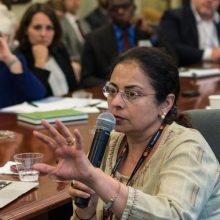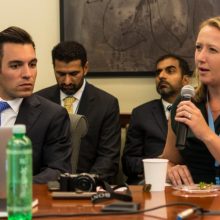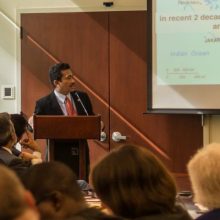Concerned about increasing restrictions on religious freedom worldwide, parliamentarians from more than 50 countries have pledged to pursue efforts to strengthen and promote freedom of religion or belief in their work at the national, regional and global levels.
Meeting as the International Panel of Parliamentarians for Freedom of Religion or Belief (IPPFORB), some 100 national legislators also vowed in a resolution to enhance cooperation on the issue through expanded networks, information sharing, and stronger links to civil society, religious groups, and academia.
“It is necessary to work across borders because, often time, the challenges are of a transnational or regional nature,” said Aykan Erdemir, a former Turkish MP and a founding member of the IPPFORB, presenting the conclusions of a two-day meeting, held 18-19 September 2015.
“For example, we have raised the challenge of defending religious freedoms among internally displaced people and migrants, global migrants, and also minority populations. The flows of individuals across borders, whether of their own free will or because they are forced to, pose new challenges to states and non-governmental organizations,” said Dr. Erdemir.
The group also dispatched letters to government and parliamentary leaders in Iran, Myanmar and Vietnam, expressing particular concern about violations of religious freedoms in those countries.
In the letter to Iran, which was signed by 66 parliamentarians, the group called on Speaker of the Iranian Parliament Ali Larijani to intervene in the cases of the seven imprisoned Baha’i leaders, imprisoned Christians, and other “prisoners of faith” to “ensure they are immediately released, that their human rights are respected, and that Iran lives up to its international obligations.”
The Baha’i International Community (BIC) gave support to the meeting by hosting a break-out session in its New York conference room.
“As the BIC said in a statement a decade ago, ‘The freedom to hold beliefs of one’s choosing and to change them is central to human development as it makes possible the individual’s search for meaning – a distinguishing impulse of the human conscience,’” said Bani Dugal, the principal representative of the BIC to the United Nations.
“As a worldwide religious community, which regards the human conscience as sacred and upholds the individual’s independent search for truth, we applaud such gatherings as these, which are searching for practical solutions about how humanity can increase the possibilities for all men and women to find such meaning in their lives,” said Ms. Dugal.
On Friday, parliamentarians heard that religious intolerance is on the rise around the globe.
Nassir Abdulaziz Al-Nasser of the United Nations Alliance of Civilizations said humanity is facing the worse refugee crisis since World War II.
“Million have left their homes,” said Mr. Al-Nasser. “The situation is caused by wars, conflicts or ethnic cleansing. At the source of these historic conflicts, you will find one common thread: a lack of respect for differences of religion or belief.”
Ivan Šimonović, the UN Assistant Secretary-General for Human Rights stressed the connection between freedom to believe and other fundamental human rights.
“Freedom of religion cannot exist if freedom of expression is not respected,” said Dr. Šimonović. “Freedom of expression is essential in creating an environment in which constructive discussions about religious differences can be held.”
Cardinal John Onaiyekan, Catholic Archbishop of Abuja, Nigeria, said religious leaders must take responsibility for fighting religious intolerance. “Religious leaders often determine the attitudes of their respective communities,” he said. “If you find a society that is not respecting religious rights, the religious leaders have a responsibility to do something about that.”
The parliamentarians also heard from representatives of religious minorities who face persecution.
A panel on Saturday morning, for example, featured the wife of Saeed Abedini, a Christian pastor currently imprisoned in Iran, and the nephew of Jamaloddin Khanjani, one of the seven imprisoned Iranian Baha’i leaders.
“Christians in Iran are living in fear of being arrested simply for gathering to read the Bible,” said Mrs. Nagemeh Abedini. “That’s why my husband was sentenced to eight years in prison.”
Siovash Khanjani said the entire family of his uncle had suffered not only unjust imprisonment for their beliefs but also economic deprivation. He described how the government has over many years destroyed the family’s 70 hectare farm, which had been a model of agricultural production, producing tons of apples and almonds in a desert region.
Recently, he said, Revolutionary Guards with government cooperation had filled in deep wells that provide irrigation for the farm, “rendering them totally useless” – “all because the owners were Baha’is.”
Noting that Baha’is are often imprisoned on charges of violating national security, he asked: “What national security purpose is served by the destruction of vast farmlands?”
In the break-out session held Friday afternoon at the offices of the Baha’i International Community, parliamentarians and representatives of civil society discussed how they can work together to promote religious freedom.
The keynote speaker there was Irfan Abubakar, director of the Center for the Study of Religion and Culture, which is based in Jakarta, Indonesia. He described efforts by his center to work with religious leaders and police commanders to help prevent religious violence and intolerance, which has occurred particularly between “hardliner” Sunni Muslims and minority Ahmadi Muslims.
Their focus, he said, was to pierce the misperception that he said many Muslims have that human rights is antithetical to Islam.
“They perceive human rights as an agenda to destroy Islamic culture and Islamic tradition,” said Dr. Abubakar. “So this prevents them from having a dialogue and to better understand human rights for their own needs. These two factors contribution to religious intolerance in Indonesia.”
The breakout session at the Baha’i offices also produced a set of recommendations, which called on parliamentarians, governments, and civil society to “act together in the spirit of the common good” to protect freedom of religion or belief. It also urged parliamentarians to “reform or repeal” national laws that violate standards of freedom of religion or belief.
The IPPFORB meeting was co-sponsored by Konrad Adenauer Stiftung, with support from the German Mission to the UN, the Norwegian Ministry of Foreign Affairs, the US Commission on International Religious Freedom and others.



Leave a Reply